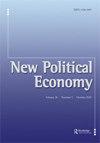中国金融化了吗?中国金融两次历史性变革的意义
IF 3.8
2区 经济学
Q1 ECONOMICS
引用次数: 0
摘要
本文通过分析中国金融体系的两个关键转型,解决了中国经济中是否存在金融化的问题。第一个是国家主导的改革进程,中国金融体系引入了市场实践,这与中国经济的其他领域类似。第二个是市场主导的过程,反映在影子银行的出现和崛起上,影子银行起源于金融市场内部,目的是绕过贷款限制。本文表明,尽管经历了两次转型和过去40年金融的巨大增长,但中国金融体系的基本特征表现出显著的连续性。换句话说,它仍以银行为基础——尽管已部分自由化——银行信贷占主导地位,政府在其中占据重要地位。中国金融的关系和政府控制结构尚未被独立的私人机制所取代。基于这些理由,认为中国经济已经金融化还为时过早。本文章由计算机程序翻译,如有差异,请以英文原文为准。
Is China financialised? The significance of two historic transformations of Chinese finance
This article tackles the question of whether financialisation is present in the Chinese economy by analysing two key transformations of the country’s financial system. The first was a state-led reform process through which the Chinese financial system introduced market practices, similarly to the rest of the economy. The second was a market-led process, reflected in the emergence and rise of shadow banking, which originates from within financial markets with the aim of bypassing loan restrictions. The article shows that despite the two transformations and the enormous growth of finance during the past four decades, the underlying character of the Chinese financial system exhibits remarkable continuity. Namely, it remains bank based – albeit partially liberalised – with a predominant role for bank credit and a strong presence for the state. The relational and government-controlled structures of Chinese finance have not been replaced by arm’s length and private mechanisms. On these grounds, it is premature to consider the Chinese economy to be financialised.
求助全文
通过发布文献求助,成功后即可免费获取论文全文。
去求助
来源期刊

New Political Economy
Multiple-
CiteScore
10.10
自引率
9.50%
发文量
41
期刊介绍:
New Political Economy aims to create a forum for work which combines the breadth of vision which characterised the classical political economy of the nineteenth century with the analytical advances of twentieth century social science. It seeks to represent the terrain of political economy scholarship across different disciplines, emphasising original and innovative work which explores new approaches and methodologies, and addresses core debates and issues of historical and contemporary relevance.
 求助内容:
求助内容: 应助结果提醒方式:
应助结果提醒方式:


